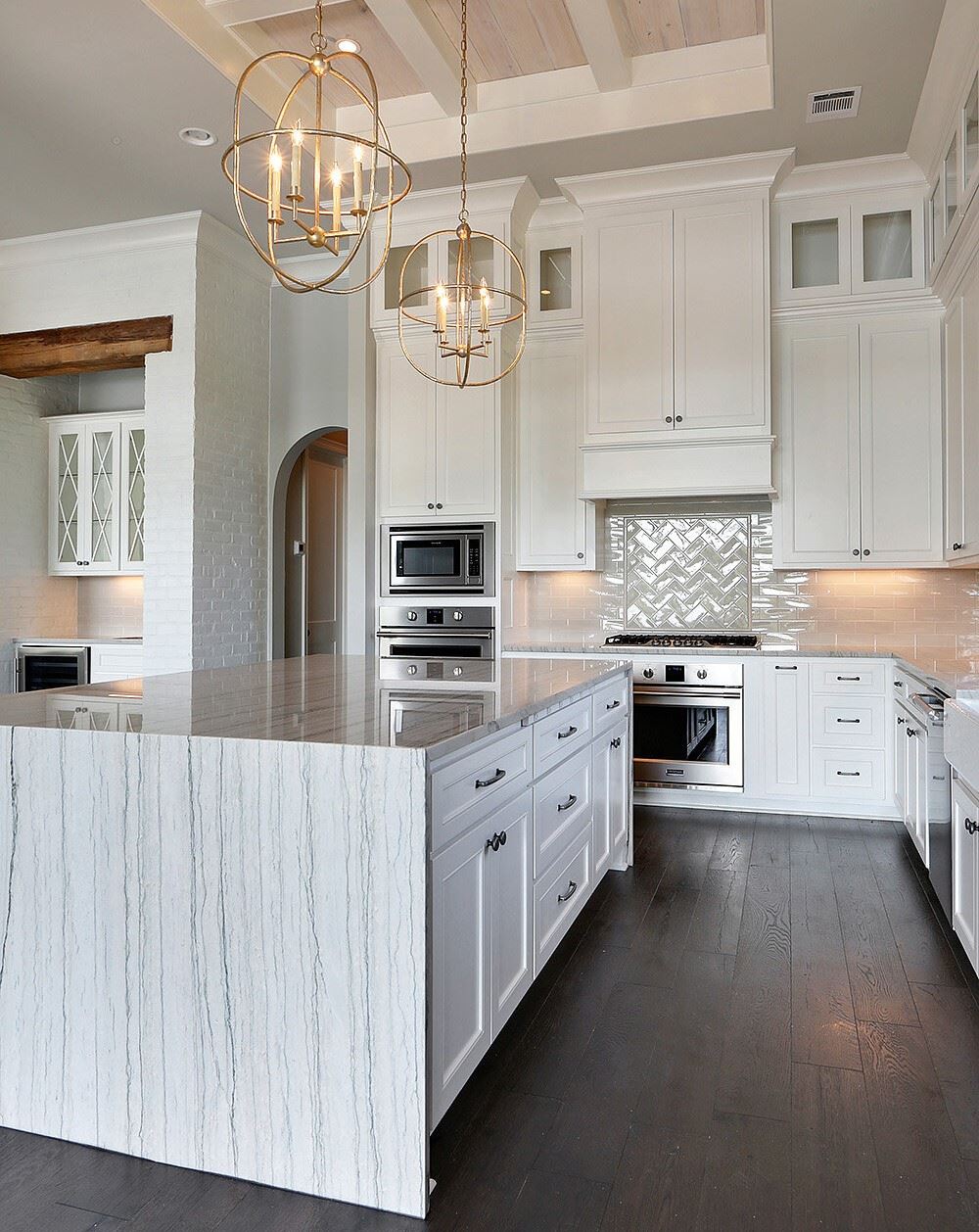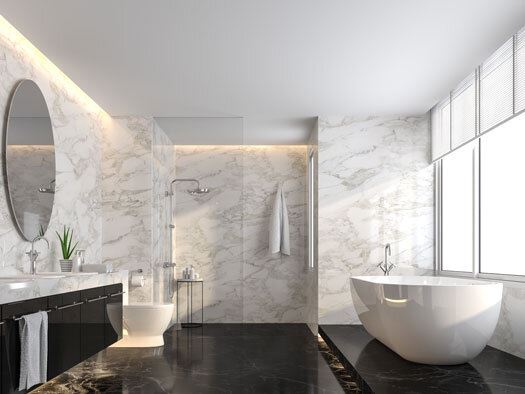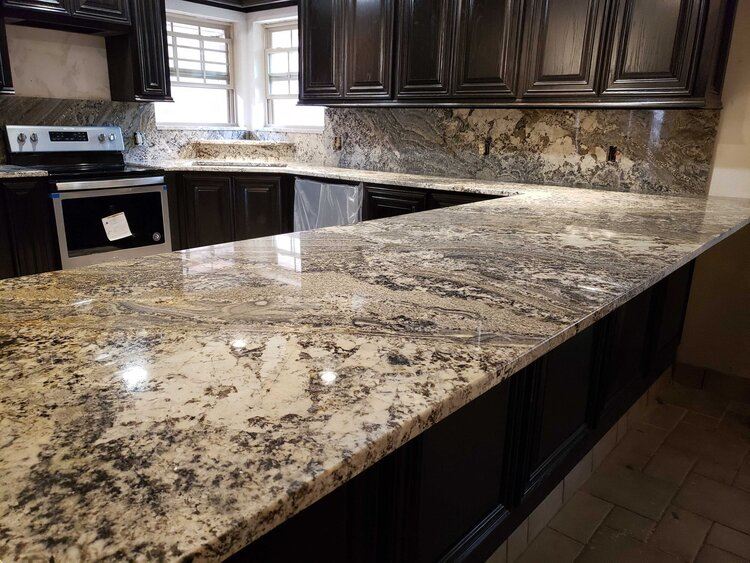
Learn More About Our Materials
Quartzite

Quartzite is a natural, metamorphic stone that forms when limestone, sandstone, pressure, and heat meet. With its light colors and subtle veining, it can be an excellent stand-in for those wanting a marble look with more durability. Quartzite can be of exceptional strength- even stronger than granite- with intense density and hardness. The strength, abrasion resistance, and weathering durability of this rock stone means it can be used both indoors and outside.
The Pros of Quartzite
- Sturdy and durable: The Mohs Hardness Scale ranks quartzite at a 7-8, while granite is a 6.5. Very few materials have the ability to scratch or chip quartzite because of this. That being said, it’s not wise to cut directly on the surface- cutting on the surface will lead to the breakdown of your sealer and open up opportunities for impurities to tarnish the surface.
- Resistant to UV rays: This means that it can be used in outdoor settings, making it perfect for an outdoor setting or an interior room that has lots of direct natural sunlight!
- Low maintenance: No need to purchase expensive cleaners! A simple, non-abrasive cleaner such as 409 Multi-Surface, Mrs. Meyers, or SimpliGreen are excellent choices for your countertops. You can also use dish soap and water!
- Resistant to etching: While it’s always advised to clean up any oily or acidic spills as soon as possible, as well as to not cutting directly on any stone surface, quartzite is incredible resistant to both staining and etching.
- Temperature resistant: Quartzite is resistant to both heat and cold! Many stones will easily crack or fissure when extreme temperatures rest on its surface, quartzite will certainly put up a fight. This quality makes it an ideal material for a kitchen or outdoor setting! Experts still recommend the use of a hot-pad or trivet for prolonged heat exposure such as resting pans straight out of the oven or a crockpot that will be on for hours.
The Cons of Quartzite
- Price: Because of the hardness and density of quartzite, it can be rather difficult for machinery to cut. Pricing also depends on where a stone was excavated from and how strenuous the process is. Realistically, the only downside to this material is the price, often costing more than marble.
Marble

Marble is a semi-soft material composed of heated and pressured limestone and calcite. It’s typically light in color- mostly whites with some pink, blue, green, or even black hues. Marble is also somewhat translucent, often allowing you to see a few millimeters past the surface, which gives the material more depth.
The Pros of Marble Countertops
- Cost: Not all marble countertops will break the bank. You can find good choices in common marble materials that can potentially cost less than higher grade granite, soapstone, quartz, or quartzite. Some Brazilian marbles are very beautiful and also affordable.
- Appearance: As far as aesthetics go, it is hard to compete with marble. Its beauty can easily transform a kitchen, bathroom, or laundry room into pure elegance. Your choice of hues includes solid white, solid black and a range of variety colors in the rose, yellow, gray, green, white and black.
- Heat: Marble can handle the heat. However the heat can damage the sealer that is protecting your countertop from stains.
- Flexibility: Marble is naturally softer than granite or quartzite, but being softer gives it a unique advantage. If your kitchen needs more than just a rectangle slab, this is where marble’s softness becomes an advantage. Marble is easier to cut into odd shapes and can be outfitted with fancy edges.
The Cons of Marble Countertops
- Cost: Even though there are some slabs of marble that will cost less, if you want to have a wide selection, you will be paying for it. When it comes to marble, it is all about supply and demand. If you are looking at a rare type of marble like Calcatta Gold marble, you are going to pay a high price. If you are looking at a common variety, you can potentially save money.
- Acids: Acids will etch your marble countertops. Marble reacts with acid. If you spill juice, wine (especially red wine), or even vinegar, you can damage your marble. Marble will come with a sealant that will prevent the stain from setting in, but you will need to act fast. If you forget about the spill, you will end up with a stain that may not come out..
- Oils: Since marble is naturally porous, substances like acids and oils have the tendency to sink into the surface. Certain types of oils that you use in your kitchen can seep through the surface and leave a stain. When it comes to marble, you will always need to clean up any spills.
- Scratching: Marble is one of the softer countertops.Granite ranks around a seven, while marble ranks around three to five. Since Marble is soft, it is more likely to scratch or chip than harder materials. In order to protect your marble countertops, you will want to use hot pads and trivets. You will always want to use a cutting board because a metal knife can scratch the surface of a marble countertop.
- Maintenance: Marble comes with a seal coat that protects it. To keep your marble countertops looking their best, you will need to reseal them every 6 months to a year. Keeping the sealant in place will do a lot to protect your marble countertops. Avoid heavy use. The potential to scratch, chip, or crack a marble countertop will always be higher than other surfaces. Remember that any stains can easily become permanent; you will always want to clean up spills quickly.
Granite

Granite is an igneous rock composed of silica, quartz, alkali feldspar, and plagioclase that forms as magma slowly cools. The color patches tend to have a more grainy, blurry look rather than distinct streaks. Unlike other stones, granite is completely opaque, so you will only see the outermost layer of the surface.
Pros of granite
- Heat resistant: Like quartzite and marble, granite is heat resistant. Also like the aforementioned, the use of hot pads or trivets is recommended during prolonged exposure.
- Variety of color variations: Granite comes in a plethora of colors to suit your every style and color scheme. We have granites that are white, cream, brown, rust, black, grey, green, blue, and more!
- Dense material: Because of its density, this stone is less susceptible to scratches and etching, making it an excellent choice for busy, busy kitchens! Like quartzite, it’s less susceptible to staining and etching, though it’s not impossible.
Cons of Granite
- Porous material: Like marble, granite is a porous material. It’s less likely to stain than marble, but caution still needs to be used with these countertops. Darker colors are less likely to have visible stains, but we do still recommend sealing your countertops to avoid any issues with this.